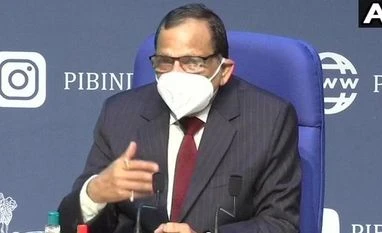The Centre on Friday said that availability of Covid-19 vaccines in the private sector should be utilised ‘optimally’. Stressing that vaccine availability has increased thanks to ‘hand-holding’ with the manufacturers, and would continue to improve in the coming days, V K Paul, member, health NITI Aayog urged citizens to utilize the private sector channel to get vaccines as well.
Responding to a query on shortage of vaccines in some cities like Delhi where people are finding it difficult to get a second dose of Covaxin, Paul said, “I urge that vaccine availability in the private sector should be utilized optimally. We should look at that channel of availability also. We should encourage people and also help people to take vaccine from the private channel as well.”
He added that overall vaccine distribution is done systematically according to availability from manufacturers. This ‘visibility’ on how many doses are expected in the coming days is shared with the state governments, and they need to plan their vaccination drives accordingly. “As we move forward, there will be more vaccine availability, and that would ease things a bit,” Paul said.
Joint Secretary, Ministry of Health, Lav Agarwal too said that they have been working closely with vaccine manufacturers to ensure the production capacities are increased. “We have been able to come from 2 lakh doses given per day to 4.1 mn doses per day. We have ensured that manufacturers increase capacity,” he said.
Agarwal added that the vaccine logistics management has to be done with a ‘just in time’ approach. From identifying how many doses will be available from which manufacturer and when, to testing these batches and delivering it to the remote parts of the country – it needs a ‘well calibrated’ planning.
“States also have to do cutting edge planning for vaccination drives. Once one knows how many vaccines will come about 15 days ahead, and then they need to engage with the local community, with the vaccination centers at field level, and ensure that whatever is made available (by the Centre) is smoothly made available to the people,” Agarwal said.
The Health Ministry said from 235,000 doses a day in January to 4.16 million doses per day in July, the daily vaccination rates have picked up significantly. Of the 119.7 million doses given in June, 52.6 million doses were given between June 21 and 30. The average daily doses between that period rose to 5.26 million a day.
MoH cautions against crowding in tourist places
In what one may call ‘revenge travel’, people are flocking to popular tourist spots in the hills in droves. The Centre has been consistently cautioning against compromising social distancing norms.
On Friday, MoHFW drew upon examples from other countries including UK, Russia where the Euro Cup football tournament has seen thousands of spectators thronging the stadiums, and highlighted how daily Covid-19 cases have started rising in these nations. It mentioned other countries like Indonesia, South Korea and Bangladesh which are again tightening norms as cases start to mount.
A video showing hundreds of tourists without masks enjoying a Mussourie tourist spot has been trending in social media this week. A concerned health ministry showed the video during the presser, asking "Is it not an open invitation for Covid-19 virus to infect us?"
Paul and Agarwal reiterated that India still had a chance in checking the spread of infection. The local authorities at tourist spots need to exercise caution and restraint, they said.
“Cases around 35,000-40,000 daily, are about one-third of the peak of the first wave. The second wave is not yet over, the war is not over…The nation is not safe. We have seen this in the past, there were predominant localised infections and then that exploded,” Paul cautioned.
The baseline of daily cases would be something below 10,000 cases daily and that lasts for three weeks at least, he felt.
“The rate of decline of the number of cases is somewhat slow, and if we do not make concerted efforts to control the virus, the virus may have an upper hand over us,” Paul cautioned.
Lambda variant not found in India yet
V K Paul, member (health), NITI Aayog, said that the Lambda variant of Sars-CoV-2, originally detected in Peru, has not been found in India yet. It is a variant of interest and its total significance in public health is being studied. “Our surveillance system is strong, and has not picked up the Lambda variant yet,” he said. The Kappa variant was detected in India around February-March, but it was “overwhelmed” by the Delta variant.
Team sent to Kerala to inspect Zika virus cases
As cases have been reported from Kerala of people infected with the Zika virus, the health ministry said a senior team has been sent to the state to inspect the same. The statewas put on alert on Friday. A 6-member team, which comprises public health experts, vector control experts, as well as clinicians from AIIMS, has gone to Kerala to help the state government manage Zika, the ministry said.
Unlock 30+ premium stories daily hand-picked by our editors, across devices on browser and app.
Pick your 5 favourite companies, get a daily email with all news updates on them.
Full access to our intuitive epaper - clip, save, share articles from any device; newspaper archives from 2006.
Preferential invites to Business Standard events.
Curated newsletters on markets, personal finance, policy & politics, start-ups, technology, and more.
)